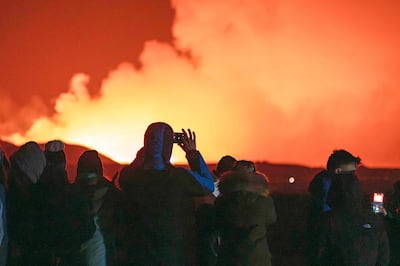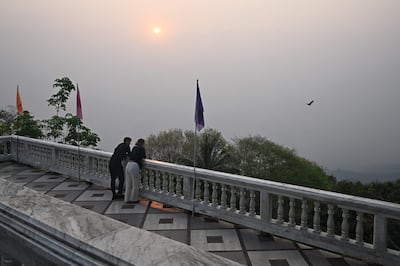Weather and natural events around the world were impacting tourism this week as Iceland’s fourth volcano eruption since December unfolded just outside Reykjavik and Thai beauty spot Chiang Mai ranks highest in a list of the world’s most polluted cities.
Qatar Airways’s new chief executive announced a U-turn on the airline’s decision not to introduce a new first class cabin and luxury hotels are getting onboard with sleep tourism.
Here’s a round-up of recent travel and tourism news – in case you missed it.
Qatar Airways to add new first-class cabins

Premium travelers flying on Qatar Airways will soon be able to travel in brand-new comfort, as the Gulf airline is introducing an upgraded first-class cabin.
In his first interview as the new chief executive of the country’s flag carrier, Badr Mohammed Al-Meer told CNBC that plans were already well underway for the new class of travel.
“Based on the demand from certain sectors, we see a high demand for first class, and as such, have decided to introduce a newly-designed first class cabin unique to Qatar Airways. No one can develop a first class cabin better than us – we are combining the experience of flying commercial and executive jets to develop something new. We are 70 to 80 per cent ready and are only finalizing colors,” said Al-Meer.
Qatar Airways will also reveal a new design for its business class Qsuite at the Farnborough International Airshow in the UK in July, the chief executive said.
Al-Meer replaced the airline’s long-time chief executive Akbar Al Baker last year. Al Baker had previously said that the airline would no longer feature first-class berths in its next generation aircraft.
Flying to 170 destinations around the world, Qatar Airways is due to launch inaugural flights to Tashkent and Hamburg in June and July respectively. It will also resume seasonal flights to Adana, Antalya, Bodrum, Marrakesh, Mykonos, Sarajevo and Trabzon this summer.
Iceland flights uninterrupted by fourth volcano eruption

Flights to and from Iceland are operating normally despite a volcano eruption that began on March 16.
The fissure eruption started on the Reykjanes Peninsula by Hagafell and Stora-Skogfell just after 8pm on Saturday evening. It was measured to be 2.9km long, according to the Icelandic Meteorological Office.
The incident is the fourth time there has been a volcanic eruption in the area since December.
The UK Foreign Office updated its travel advice for tourists on Saturday in light of the incident, advising holidaymakers to stay away from the town of Grindavik and warning that the chance of further eruptions is high. It is also acknowledged that Keflavik International Airport, Reykjavik and the rest of Iceland are not currently impacted by the eruptions.
According to Visit Iceland, the country’s tourism organisation, Iceland remains a safe destination to visit.
Impact has been localized and controlled via road closures, said Visit Iceland, revealing that authorities had previously issued warnings ahead of the eruption on the Reykjanes peninsula, just south of Iceland’s capital Reykjavik.
The government of Iceland website advises travelers to contact their hotel or travel agency for any updates relevant to upcoming travel plans, but states that “Iceland is generally well-prepared to deal with seismic and volcanic activity, which is a regular feature of life in our country.”
Thailand’s tourist beauty spot tops list of world’s most polluted cities

The streets of Chiang Mai were enveloped in thick smog on Friday and Saturday as the Thai tourism spot ranked as the world’s most polluted city.
Known for its picturesque mountains and scenic views, the northern city had the highest reading on IQAir’s table of the world’s most polluted cities, ranking above Uzbekistan’s Tashkent and Beijing and Hangzhou in China.
Levels of hazardous small particles in the air in Chiang Mai were recorded at 221 micrograms per cubic meter on Friday, the highest among a list of most polluted international cities, according to data from IQAir, which provides global air pollution information.
Thailand’s prime minister visited the tourist hotspot on Saturday when it continued to have the world’s worst air quality for the second day in a row. He promised to tackle air pollution.
The tourism hotspot which is the historical capital of the old Lanna Kingdom struggles with seasonal agricultural pollution as farmers burn crops to clear land. Forest fires and exhaust fumes have compounded the issue.
In 2019, before the global pandemic, more than 5.6 million people visited the northern city annually before the global pandemic according to data from Visit Chiang Mai.
The big snooze: Hilton introduces sleep retreats

A recent trends report from Hilton found that the number one reason for people to travel this year is for rest and relaxation. With the quest for quality sleep a key motivator for travelers worldwide, the global hotel brand is introducing new sleep retreats at hotels around the world.
The hospitality brand has partnered with sleep science expert Dr Rebecca Robbins to optimize the ways it can promote a great night’s sleep across its global portfolio. The new one-of-a-kind sleep-focused retreats will launch at the Grand Wailea, A Waldorf Astoria Resort on Maui where Dr Robbins will offer guests in-depth insights into the science and practice of achieving restful sleep. Hilton aims to roll out more sleep retreats in other markets after the launch of the program in Hawaii.
“Hilton seeks to provide more than just a place to stay. We aim to be a catalyst for wellness, starting with a great night’s sleep. Recognizing that more than half of all travelers surveyed in our recent Trends Report emphasized the need for rest when they travel, our commitment has never been more important,” said Amanda Al-Masri, global vice president, wellness, Hilton.
First making waves last year, sleep tourism has accelerated in 2024 and is part of a growing wellness tourism industry, one of the fastest-growing segments of travel that’s projected to reach $1.4 trillion by 2027 according to the Global Wellness Institute.
Updated: March 18, 2024, 2:44 PM
